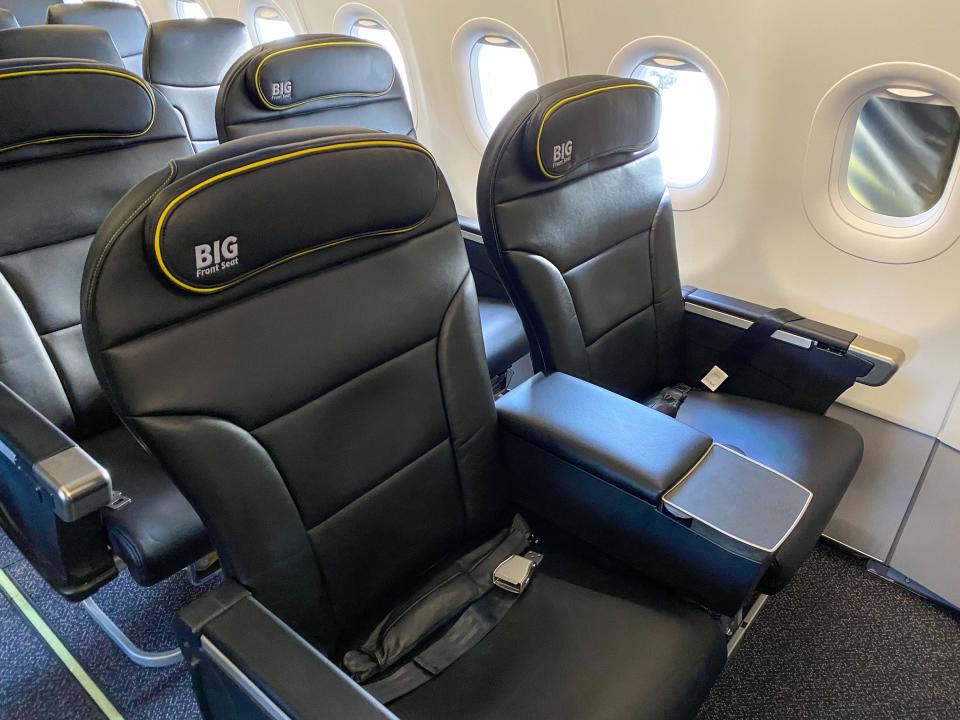Spirit Airlines is making big changes to how it sells tickets
Spirit Airlines announced a complete overhaul of its ticket offerings targeting premium customers.
The airline also introduced priority check-in and boarding for premium and frequent fliers.
Spirit's premium transformation results from the low prices that hurt airline profits this year.
Spirit Airlines plans to completely transform how it sells tickets, bundling together previously à-la-carte items like free snacks and checked bags into categories that make the budget airline look more like its competitors.
Among the new premium perks for higher levels announced on Tuesday are priority check-in and boarding for premium passengers, Spirit credit card holders, and Gold-level frequent fliers.
The four ticket bundles range from the no-frills service frequent Spirit flyers are used to up to a more business-class-like premium seat. Here are the details:
Go: The Go bundle is the most budget-friendly, including only a seat and a personal item. Everything else is an optional extra.
Go Savvy: The Go Savvy bundle adds a carry-on or checked bag and seat selection.
Go Comfy: The Go Comfy bundle adds a carry-on and a checked bag, seat selection in rows with the middle seat blocked out, snacks and drinks, and priority boarding.
Go Big: The Go Big bundle offers every amenity available to Spirit customers, including the airline's "Big Front Seats," which are four per row and comparable in size to a domestic first-class seat on a mainline carrier like Delta or American. Go Big is the only bundle to feature priority check-in and Wi-Fi.
The new ticket bundles go on sale August 16 for flights starting August 27.

Airlines are getting hit hard by low ticket prices.
The Florida-based ultra-low-cost carrier, known for its rock-bottom fares and à la carte pricing strategy where every amenity is an optional extra, has seemingly abandoned its budget-friendly persona with the introduction of these new perks geared toward premium passengers.
It's a move made purely out of necessity.
Airlines across the industry have had to deal with escalating costs and thinning margins.
Spirit, which lost $143 million during the first quarter of 2024, is particularly vulnerable as it worked to recover financially from the costs created by its failed $3.8 billion merger with JetBlue in March.
However, unlike mainline carriers, low-cost airlines like Spirit and Frontier do not have the benefit of high-margin business and first-class cabins to lean on for extra cash.
Consequently, they've resorted to flooding the market with cheap seats to generate additional revenue and fill planes. That's benefited passengers, but hurt their bottom lines.
"The unprofitable capacity is just not sustainable," United Airlines' chief commercial officer Andrew Nocella told investors during its July earnings call.
Industry leaders like Delta CEO Ed Bastian have even questioned the long-term sustainability of the country's low-cost airlines.
Spirit isn't alone in trying to tap into the premium options to up revenue.
Southwest Airlines is scrapping its long-standing open cabin seating policy to appease premium customers who want the ability to pre-select their seats.
In addition, Alaska Airlines announced this month that it's retrofitting its Boeing 737 fleet to add 1.3 million first-class and premium economy seats annually. The retrofit starts in September and will ensure that each Alaska Boeing 737 has 16 first-class and 30 premium economy seats.
Read the original article on Business Insider

